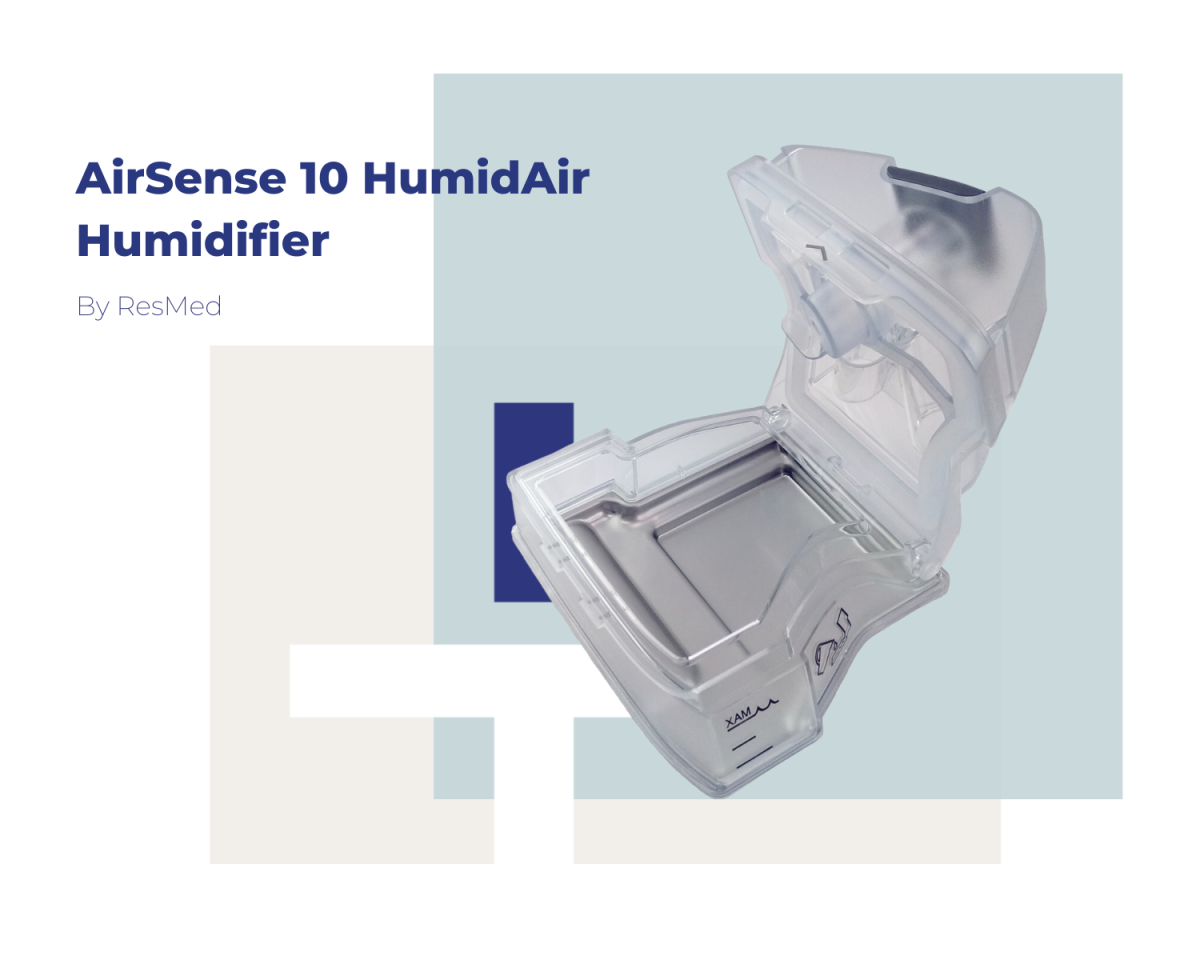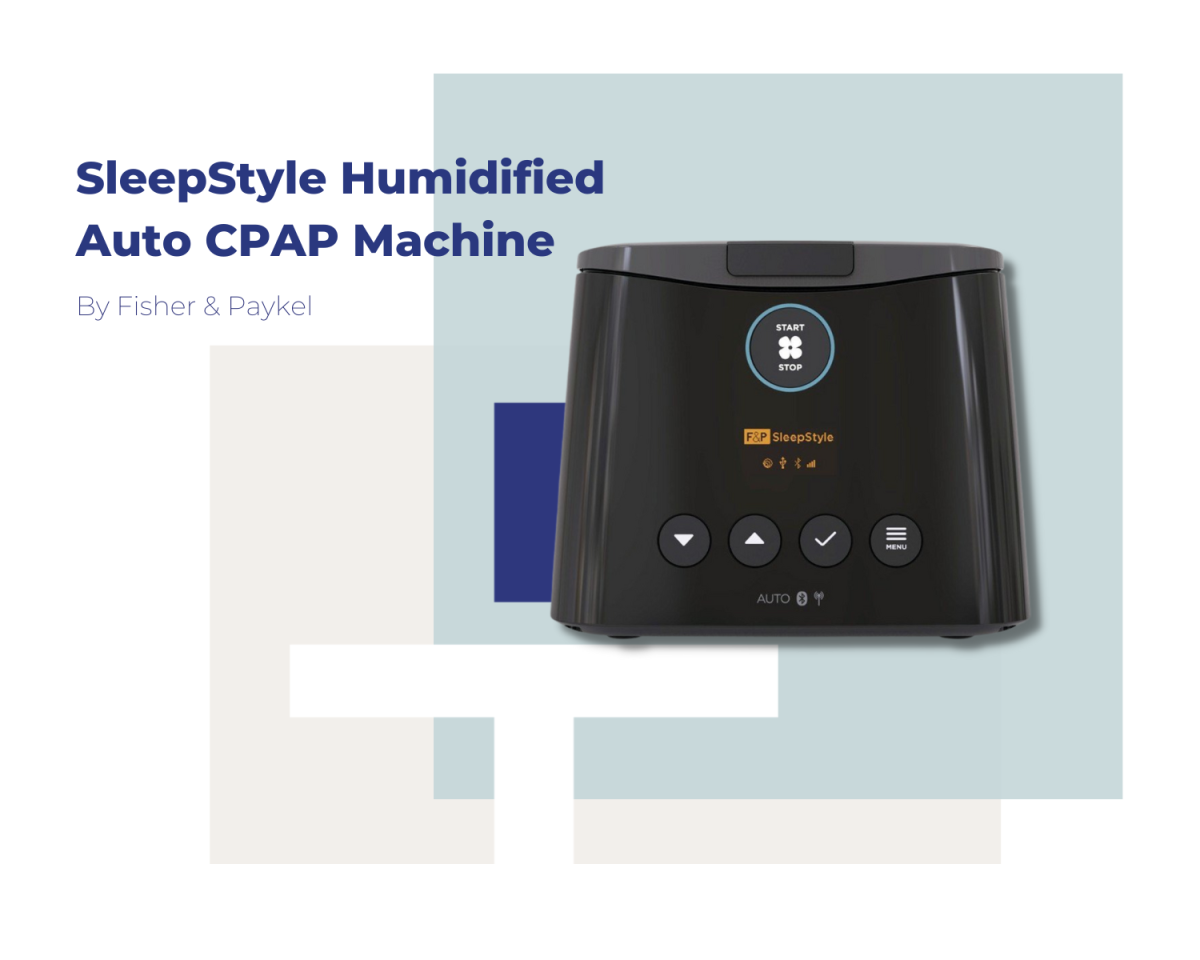All you need to know about CPAP humidification
What does a humidifier do on a CPAP machine?
The main component of a humidifier is a water chamber which is filled with distilled water. The distilled water adds moisture and softens your airway pressure. The water chamber is connected directly to the CPAP machine and, in turn, to the hose that attaches to your CPAP mask. When the machine and humidifier are activated, a small amount of distilled water will transform into vapour, leading to higher humidity levels within the airflow.
The primary result is a more comfortable breathing experience during the hours when you are using the machine.
Is a humidifier necessary for CPAP?
No, you can use your machine without a humidifier and a humidifier is not essential for effective therapy, however, some individuals find that they are uncomfortable using a CPAP machine if the airflow is too cold and humidification holds many benefits to increase comfort.
CPAP humidifiers are excellent options if you have trouble sleeping with your current unit. They are also worthwhile recommendations for anyone who sleeps in a cool and dry environment. If you have been struggling with your current CPAP unit or constantly wake up throughout the night, it is wise to look at the different humidifiers available.
Let’s never forget that the primary intention of CPAP therapy is to provide you with a good night of sleep, so the addition of a cutting-edge humidifier can represent a very effective comfort option.
Check our range of humidifiers to see if there is a option for your CPAP machine.

CPAP optional humidification
Some CPAP machines give you the option to add a humidifier to your therapy at any later date. The ResMed AirSense 10 device can be paired with the HumidAir humidifier. The water chamber easily connects to the end of the machine. Please be aware the HumidAir is only compatible with the AirSense 10. Watch how the chamber connects to the device here.
Pros and cons of a CPAP humidifier
Pros of a CPAP humidifier
The primary purpose of a CPAP humidifier is to eliminate some common issues that CPAP users experience, particularly those who might not be accustomed to a constant flow of air into their mouth and/or nose. These include:
- Sneezing
- Cold, uncomfortable airflow
- Dry mouth and nose
- Sinus congestion – click to find out more about sinus and nasal care
- Coughing due to a dry throat
- CPAP mask leaks
- Headaches
A CPAP humidifier can also address a condition known as upper airway resistance syndrome (UARS). This situation is essentially a combination of the symptoms outlined above. As your mouth and throat remain moist, the body will no longer need to produce excessive mucus levels. Resulting in fewer instances of coughing and sneezing.
Using your CPAP settings, you can find the best humidity level for your therapy. If you are new to using a humidifier, set your humidity level to three and adjust it up or down to address any discomfort.
Cons of using a CPAP humidifier
While CPAP humidifiers are extremely useful, it is still important to highlight a handful of potential issues which might decrease effectiveness. However, these can be easily resolved!
The most common issue is known as rainout.
What is Rainout?
This is another term for describing condensation that can accumulate within the tube leading up to the face or mask. This type of condensation is caused by differences in air temperature (think of the water that forms on a cold glass’s surface when placed within a warm environment). Such a situation can lead to a gurgling sound, which may sometimes be slightly uncomfortable while lying in bed.
A CPAP heated tube or a hose fleece will solve Rainout effectively. A heated tube or hose fleece keeps the humidified air warm during CPAP therapy, preventing condensation.
You can also have too much humidification. Depending on the climate you live in, and how much humidity you have in your room, humidity levels from your CPAP machines can vary. Some models adjust humidity levels based on the temperature of the room.
Please note not all CPAP humidifier users have Rainout, so you may or may not come across it.

CPAP machines with built-in humidifiers
If you know you need a humidifier, then it could be worth considering a machine with humidifier built-in. An example of this is the Fisher and Paykel SleepStyle this design adds greater convenience, and they’re often more compact than having two separate units (space on your bedside table).
Why you shouldn’t you use tap water in your Humidifier?
You should only use distilled water in your CPAP humidifier. Distilled water prevents bacteria from reaching your sinuses and lungs. Mineral deposits from tap water can build up and potentially damage the machine. If your water chamber gets covered in grime too quickly, it is probably time to change the type of water you use.
Travelling with a CPAP humidifier?
You should take your CPAP supplies anywhere you go as you should never pause your therapy.
CPAP machines with built-in humidifiers can be delicate and require extra care in transit. Therefore it is advised the humidifier is entirely free of water – and preferably packed separately if you are travelling with your CPAP machine. If your humidifier chamber is detachable, empty it fully and store safely.
If you are running your CPAP machine from a 12V source (for example in a car or caravan), purchasing a 12V DC cable can ensure you can safely power your device.
Many CPAP users take a battery pack when travelling on a plane or camping. It is worth noting that a humidifier can drain your battery faster.
An alternative is to take disposable waterless humidification, these are easy-to-use and pack.
Cleaning your humidifier chamber
We advise cleaning and changing the water in the humidifier reservoir daily to increase your comfort. You can read more on cleaning your CPAP equipment in our guide here: What is the best way to clean my CPAP machine?
If you need any help with humidification or your therapy in general, please contact us.
Helpful articles:
Should I use my humidifier in the summer?
A comprehensive guide to understanding why you should use distilled water in your humidifier – Should you use distilled water in your CPAP humidifier?
Helpful advice on travelling with your CPAP supplies – Tips for travelling with Sleep Apnoea & The ultimate guide for camping with a CPAP machine


